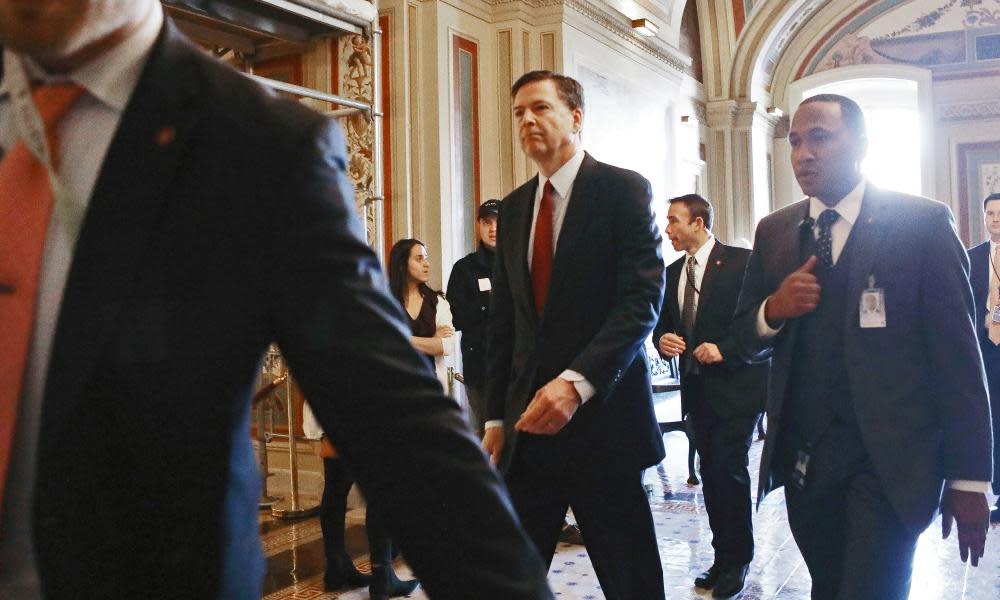White House confirms conversation with FBI about Trump and Russia

The White House has confirmed that its chief of staff spoke with top FBI officials about the bureau’s inquiry into links between Donald Trump’s associates and Russia – a conversation which appears to violate justice department rules to ensure the integrity of investigations.
The administration had sought to push back against reports from CNN and the Associated Press that the chief of staff, Reince Priebus, had asked the FBI’s top two officials to rebut news reports about Trump allies’ ties to Russia.
But in doing so, the White House on Friday acknowledged that Priebus, the FBI director, James Comey, and deputy director, Andrew McCabe, had discussed what the FBI knew about Russian ties to the Trump presidential campaign.
“The White House appears to have violated accepted protocols and procedures,” said former FBI special agent Ali Soufan.
“As an FBI agent, we always know there shouldn’t be any appearance of political interference over a pending investigation. Any kind of appearance of political influence will be considered against existing protocols and procedures.”
Another retired FBI special agent, Michael German, said the FBI leadership had potentially jeopardized an investigation.
“It is illegal for an FBI employee to take information from an ongoing criminal investigation and share it with a potential witness or subject of that investigation. Obviously, if the justice department ultimately initiates a prosecution in this matter, this purported conversation would be exculpating evidence. Again, if it is true that high bureau officials believe the current FBI investigation is [bullshit], they should close the investigation and be prepared to justify this decision, not leak their opinion to anyone outside of the investigation”, German said.
Senator Ron Wyden, an Oregon Democrat on the Senate intelligence committee – which is also investigating Trump’s ties to Russia – called on Comey to explain the communications.
“Politicized assertions by White House chief of staff Priebus about what may or may not be the findings of an FBI investigation are exactly the wrong way for the public to hear about an issue that is of grave consequence to our democracy. The American people deserve real transparency, which means Director Comey needs to come forward, in an open hearing, and answer questions,” Wyden told the Guardian.
“If, as Priebus claimed, the FBI not only discussed this issue with the White House but coordinated the White House’s public statements, the American people would also have reason to doubt the impartiality both of the bureau and the Department of Justice to which the FBI is responsible. These claims deserve further investigation.”
Trump began his Friday by tweeting an attack on the FBI for being “totally unable” to stop leaks, even from “within the FBI itself”. Speaking later at a conservative conference, Trump again attacked what he called “fake news” and said news organizations “shouldn’t be allowed to use sources unless they use somebody’s name”.
The conversations between Priebus and the FBI concern a New York Times article on 14 February, which reported that calls and phone records intercepted by US intelligence showed a pattern of communication between the Trump campaign and Russian intelligence officials.
Following an administration meeting the next morning, according to the White House, McCabe told Priebus there was nothing to the New York Times’ report, using a colorful phrase. Priebus asked: “What can we do about this?” McCabe gave no answer, and told the White House chief of staff he would get back to Priebus on the issue.
Priebus told McCabe the White House was “getting crushed” over the depth of Trump’s ties to Russia, as reported in the New York Times, and asked: “What am I supposed to do?”
Some time later, senior administration officials told reporters, McCabe called Priebus and said: “We’d love to help but we can’t get into the position of making statements on every story.”
Priebus then asked if he could cite anonymous senior intelligence officials in rebutting the Times article, to which McCabe agreed.
Afterward, FBI director James Comey called Priebus and echoed McCabe’s comments. While the story was baseless, Comey declined to issue an FBI statement saying so publicly, according to senior officials.
Asked by the Guardian whether the bureau challenges the White House’s version of events, the FBI declined to comment.
The senior officials provided their account to White House pool reporters to knock down any follow-up reporting on Thursday from CNN and the AP, both of which reported that the FBI rejected calls to publicly rebut the 14 February story.
The Priebus-McCabe-Comey discussion appears to violate longstanding justice department rules intended to insulate FBI investigations from political interference.
According to a 2009 version of those rules set by Barack Obama’s attorney general, Eric Holder, only the most senior officials can advise White House officials on active or pending investigations “when it is important for the performance of the president’s duties and appropriate from a law enforcement perspective”.
After former attorney general Loretta Lynch had a private meeting with Bill Clinton last year, widely interpreted as an inappropriate discussion of an FBI investigation into Hillary Clinton’s email server, then candidate Trump said it was “horrible” and evidence of a “rigged system”.
In both public and private meetings with Congress, Comey has continued to refuse to address whether the FBI has an active inquiry into Trump associates’ ties to Russia, despite continuing pressure from the press. Both the House and Senate intelligence committees have their own investigations into the matter, and congressional Democrats continue to push for an independent inquiry.
Nancy Pelosi, the Democratic leader in the House of Representatives, said Priebus “has committed an outrageous breach of the FBI’s independence” and “tainted the integrity of the FBI”.

 Yahoo News
Yahoo News 
